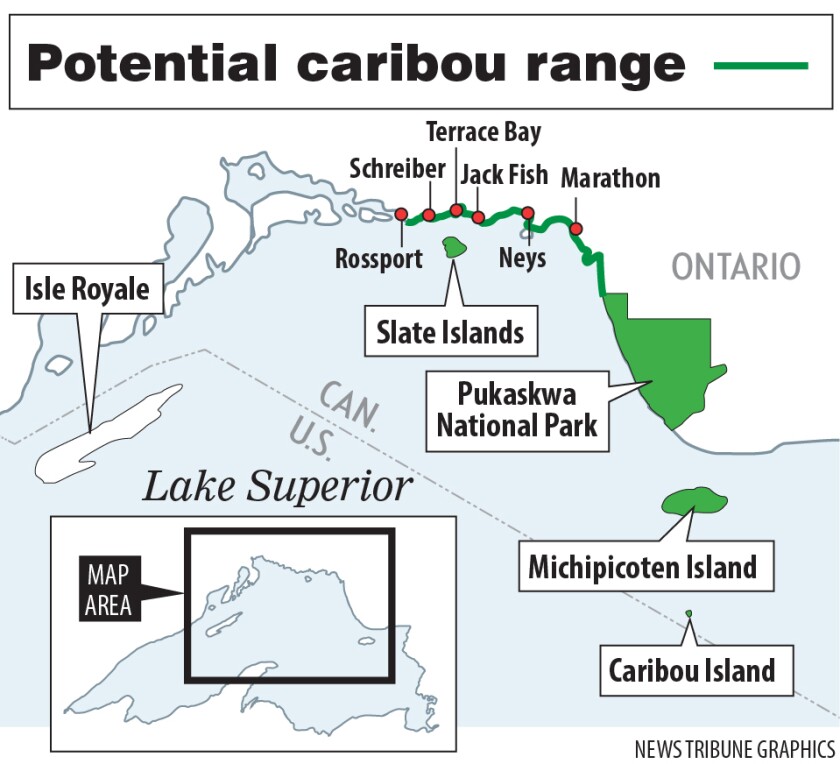DULUTH -- The good news is that Lake Superior’s last surviving wild caribou appear to be thriving on their new island homes, free from the constant menace of wolves, for now, and with plenty to eat.
But hope is dwindling that any caribou remain on the Ontario mainland of Lake Superior's North Shore, with an aerial survey last winter finding no caribou, not even any tracks.
That’s pushed caribou supporters to ask Ontario natural resource authorities to conduct a more thorough search early this winter and — if any caribou are found — trap and transplant any remaining animals to the Slate Islands on Lake Superior.
Gordon Eason, a retired Ministry of Natural Resources biologist who has helped lead the caribou protection effort in recent years, said it’s important for the Ontario Ministry of Environment, Conservation, and Parks to act quickly. The caribou supporters include a handful of biologists and researchers, local residents and members of the Michipicoten First Nations band of Ojibwe who are asking the public to write Ontario officials to urge action.
Eason said there could still be 10 or so caribou left on the mainland that managed to avoid detection last winter. Caribou supporters want the public's help to convince provincial authorities to act.
ADVERTISEMENT
“These last Lake Superior mainland caribou are now at the point where they need urgent help,’’ Eason said. “Otherwise they will be eliminated from this area which has been their home since the glaciers left.”
For their part, ministry officials responded that they are still deciding what to do, if anything, about the plight of caribou along Lake Superior’s shore.
“The ministry is aware that this issue is of great interest and importance to municipalities, Indigenous communities and industries in the area of the northern coast of Lake Superior. That is why a broader discussion regarding management of this range has been initiated,’’ Ontario natural resources officials wrote to caribou supporters. “... Numerous management actions have been identified —including caribou translocation — and all are being considered. Input received from yourselves and other interested parties is important and will help to inform the development of a future management approach for caribou in the area.”
Caribou were common all around Lake Superior — including Minnesota, Wisconsin and Michigan — before European settlement. But they have dwindled to just a fraction of their range, all on Ontario islands on the big lake and, until recently, on the mainland along a 50-mile stretch between Marathon and Schreiber.
Lake Superior caribou still numbered more than 1,000 as recently as 2014 until wolves found their way across polar vortex winter ice to several islands off the Ontario shoreline and quickly decimated caribou numbers. Caribou, especially those confined to an island far off shore and with little room to run, appear less able to survive wolf attacks than moose, elk or even adult deer.
In late 2018, a rescue effort was conducted to trap and move the last 15 remaining caribou from Michipicoten Island to the Slate Islands and Caribou Island. (Wolves that had been on the Slate Islands had run out of food and were themselves gone by 2018.)
As of this past summer, it appears about 30 caribou now are thriving on the Slate Islands, Eason said, and about 16 on Caribou Island. Eason said the goal is to build those numbers up and eventually use the islands as feeder stock to gradually bolster caribou numbers on the mainland North Shore.
While the early 2020 mainland survey found no caribou, a survey in 2019 did find a caribou sign, giving supporters some hope. Eason and other caribou supporters hope a more exhaustive search and rescue mission this coming winter may find some survivors that can be moved to an island and buy time until larger numbers of caribou can be relocated back to the mainland.
ADVERTISEMENT
It’s a biological chess game, with caribou supporters trying to stay one move ahead of wolves and caribou extinction in the Lake Superior region. Eventually, for Lake Superior caribou to survive in a more sustainable fashion, a healthy mainland population is critical, supporters say, because that’s where the animals have done the best job at developing the survival instincts to make it on their own.
“Any remaining caribou on the North Shore will be very important for eventually restoring caribou there,'' Eason said. "They have the best genetics and behavior because they have survived there the longest and are best adapted to that area.”
Eason said suitable habitat remains along Lake Superior from about Rossport, Ontario, in the west to Pukaskwa National Park in the east. Farther east or west and the caribou would run into more human development, younger, frequently-logged forests and more deer. Deer carry a parasitic brainworm that is fatal to caribou. Caribou almost certainly could not survive on Minnesota's portion of the North Shore because of high deer densities.
If the mainland caribou are indeed gone, the next nearest caribou are another 80 miles north in Ontario, leaving a gaping chunk of habitat unfilled, Eason noted. “This type of population loss and range recession is the process of extinction. Loss of the once-dominant land animal in this area also indicates that we are not managing the land sustainably.”
The News Tribune first wrote about the plight of Lake Superior caribou in 2017 and ran another update in April.
For more information go to LakeSuperiorCaribou.ca or Twitter @SuperiorCaribou.
ADVERTISEMENT











